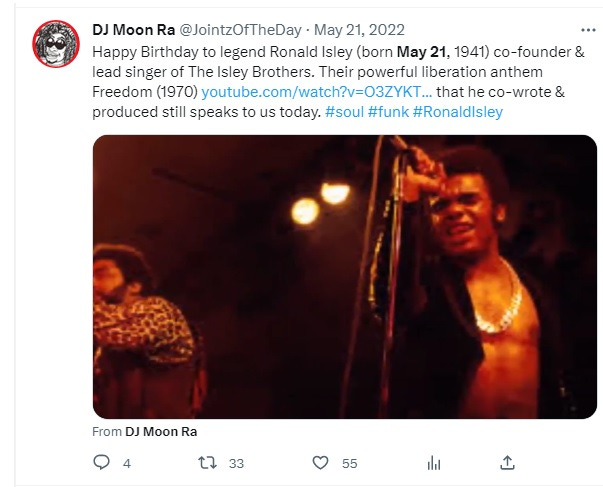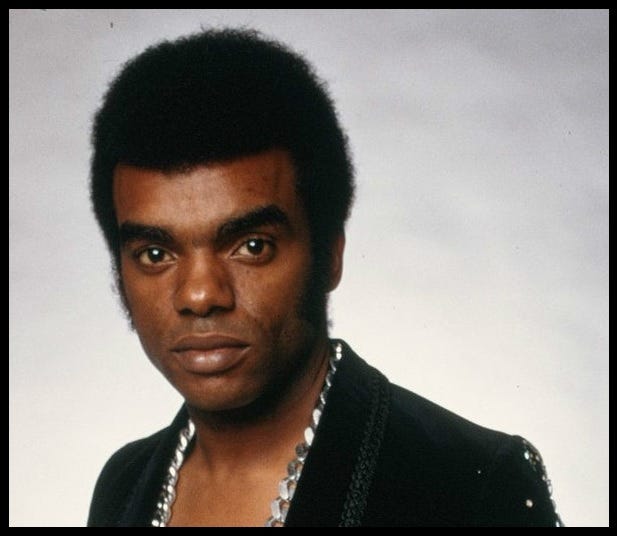Ronald Isley (born May 21, 1941) – Freedom (1970)
The Isley Brothers' lead singer co-wrote and produced this powerful message song, one of their first records to feature guitarist Ernie Isley and keyboardist Chris Jasper.
Watch full video on Twitter.
View most updated version of this post on Substack.
The living legend Ronald Isley, aka Mr. Biggs, is a multi-talented songwriter, producer, actor, and the lead singer and a founding member of the Isley Brothers.
Born in Cincinnati, Ohio, Ronald was the third of six brothers. Together with his two older brothers O'Kelly “Kelly” Isley Jr. and Rudolph Bernard Isley, plus their younger brother Vernon, the boys formed the Isley Brothers in the early 1950s, originally a gospel group. Following Vernon’s death at a young age in 1957, the three oldest brothers moved to New York City in search of a record deal.
They eventually signed with RCA Records in 1959 and released their first hit, “Shout,” which went to #47 on the Billboard Hot 100. Their biggest early record came in 1962, with their cover of “Twist And Shout,” which had been released by The Top Notes a year earlier but failed to chart despite having been produced by Phil Spector. The Isleys’ cover peaked at #2 on R&B charts and #17 on the Hot 100.
After moving from New York City to New Jersey, they formed their own label T-Neck Records in 1964 (named for the township of Teaneck, NJ). Jimi Hendrix joined their backup band as lead guitarist around this time, and was featured on two of their singles, “Testify” (1964) and “Move Over And Let Me Dance” (1965). He lived with the Isleys and was treated as part of the family. Hendrix left the band in 1965.
In 1966 they signed with Motown’s Tamla subsidiary and had a #6 R&B and #12 Pop hit with the Holland-Dozier-Holland production of “This Old Heart of Mine,” co-written by Sylvia Moy. By this point, Motown already had a deep bench of established artists, and the Isley Brothers were not a priority for the company. They grew dissatisfied and in 1968 Berry Gordy allowed them to leave the label.
They re-activated T-Neck Records in 1969 and arranged a distribution deal with Buddah Records. Their first release on the resurrected label was the massive single “It’s Your Thing,” which was released on February 16, 1969 and hit #1 R&B and #2 on the Billboard Hot 100. It went on to win that year’s Grammy for Best R&B Vocal Performance by a Duo or Group, and became the title track to their first album on T-Neck, released that April.
Several more albums on T-Neck followed in rapid succession, including The Brothers Isley and Live At Yankee Stadium which were both released in October, 1969. Their live performance at Yankee Stadium was also filmed and later released as the concert film It’s Your Thing in August, 1970.
Also in 1970 they released Get Into Something, their fourth T-Neck LP, which contained the powerful message song “Freedom.” Co-written and produced by all three brothers (O’Kelly, Rudy, and Ronald), it was one of the first songs to feature their younger brother Ernie Isley on guitar and brother-in-law Chris Jasper on keyboards. Ernie also played bass and additional percussion on the track, with studio musicians Charles “Skip” Pitts on guitar and the great Bernard Purdie on drums. Issued as one of an impressive six singles from the album, it reached #11 R&B and #72 on the Billboard Hot 100.
In 1975, their powerful anti-establishment anthem “Fight The Power (Part 1 & 2)” capped off the golden age of early to mid-70s R&B message songs as it went to #1 R&B, #4 on the Hot 100, and #13 on Billboard’s early dance charts. It was the lead single from their album The Heat Is On, and the track’s popularity sent the LP to #1 on the Billboard 200 album charts. The Heat Is On spent 40 weeks on the charts and went double platinum with over two million copies sold.
It was recorded on the same day as another of their most socially conscious tracks from this period, the anti-poverty message song “Harvest For The World.” Ernie was the primary composer of both songs, with additional instrumentation by Jasper. While recording “Fight The Power,” Ronald ad-libbed the word “bullshit” in the line “All this bullshit going down,” which surprised Ernie. When asked why he’d done it, Ronald replied, “because it needed to be said...it's what people want to hear.”
Further info:
“How the Isley Brothers made Harvest for the World,” interview by Dave Simpson, The Guardian, July 6, 2020
“How Ronald Isley Became a Multigenerational Sex Symbol,” by Bonsu Thompson, Level Man, Jun 9, 2021
“How the Isley Brothers' mom made Jimi Hendrix feel right at home in New Jersey,” by Chris Jordan, Asbury Park Press, May 5, 2022
#soul #funk #IsleyBrothers #Ronald Isley








